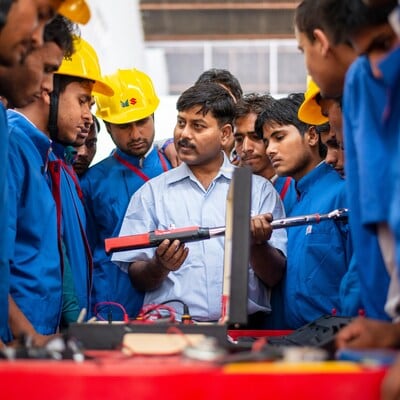Engineering students in an automobile repair training class at the government industrial training institute in Meerut. Photo: Shutterstock
Despite India’s reputation as a global powerhouse in engineering talent, a significant gap persists between the number of engineering graduates and their employability. This disparity poses a major challenge to the country’s economic growth and technological advancement.
The employability dilemma:
India produces 1.5 million engineers annually, but only a small percentage of them find employment. The employability of engineering graduates is over 60%, with only 45% meeting industry standards. Moreover, only 10% of the 1.5 million engineers expected to graduate this fiscal year are expected to find employment, according to a report by TeamLease. The main reason, according to the report, is the skill gap among engineering graduates.
“Engineering has long been a cornerstone of India’s development, emerging as one of the preferred career choices, shaping the nation’s innovation, infrastructure and progress. As we celebrate National Engineering Day, honouring the pivotal contributions of engineers in driving the country’s growth, India prides itself on being a leader in producing engineering talent, with nearly 1.5 engineers graduating annually. However, despite this impressive output, the employability of our engineering graduates remains a major challenge,” states the TeamLease Degree Apprenticeship report.
According to NASSCOM projections, India’s technology sector will need over a million engineers with advanced skills in AI and other cutting-edge technologies in the next two to three years. Moreover, the gap between supply and demand for digital talent is set to widen from 25% today to nearly 30% by 2028. The rising demand, driven by the rise of AI, electric vehicles, semiconductors and the growing electronics industry, highlights a critical challenge regarding the employability of engineering graduates.
As industries increasingly seek expertise in domains such as cybersecurity, IT, robotics and data science, it is clear that conventional academic education alone is inadequate.
To address this skills gap, essential measures include merging technical education with practical vocational training.
“Apprenticeship programs bridge this gap by offering practical, structured training alongside formal education, ensuring young professionals are job-ready from day one. With real-world experience and mentorship, apprentices can develop the critical skills needed to meet growing industry demands, benefiting professionals and employers alike,” said Dhriti Prasanna Mahanta, Vice President and Chief Business Officer, TeamLease Degree Apprenticeship.
Highlights of the report include:
Skills gap:Many engineering graduates lack the practical skills and industry-specific knowledge needed to meet employer demands.
Evolving job landscape: Rapid technological advances and the rise of emerging industries have created a skills mismatch.
The role of learning:
Closing the gap: Apprenticeships offer a valuable solution by combining academic learning with practical on-the-job training.
Industry-relevant skillsApprenticeships provide young engineers with the skills and experience needed to thrive in today’s competitive job market.
Managed Training Services (MTS): Innovative programs like MTS provide intensive, industry-focused training to improve job readiness.
Industry demands and future prospects:
-
Growing demand: The technology sector in India is projected to require over one million engineers with advanced skills in AI and other emerging technologies. -
Skills shortage: The gap between supply and demand for digital talent is expected to widen, creating a critical challenge for industries across the board. -
Focus on emerging fields: Industries such as cybersecurity, IT, robotics and data science are experiencing a surge in demand for qualified engineers.
Facing the challenge:
- Aligning engineering curricula with industry needs is essential to ensure that graduates possess the necessary skills.
- Stronger partnerships between academia and industry can facilitate knowledge sharing and skills development.
- Promoting apprenticeships and providing adequate support to both apprentices and employers can address the skills gap.
First published: September 16, 2024 | 9:29 am IS
Disclaimer:
The information contained in this post is for general information purposes only. We make no representations or warranties of any kind, express or implied, about the completeness, accuracy, reliability, suitability or availability with respect to the website or the information, products, services, or related graphics contained on the post for any purpose.
We respect the intellectual property rights of content creators. If you are the owner of any material featured on our website and have concerns about its use, please contact us. We are committed to addressing any copyright issues promptly and will remove any material within 2 days of receiving a request from the rightful owner.

